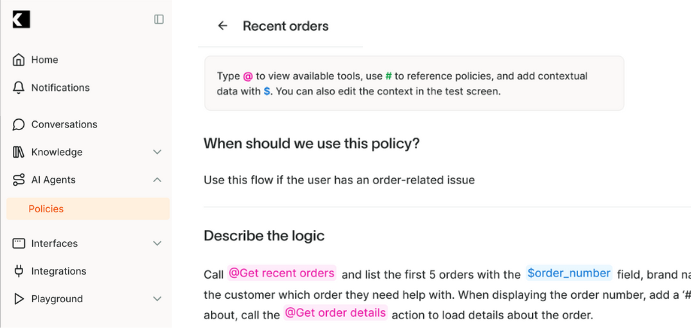Ingredients
Aftership, Salesforce Service Cloud, and Kodif.
What are AI Policies?

At Kodif, we’re excited to announce the launch of Policies—a powerful, dynamic solution designed to revolutionize the way CX managers handle customer support. Unlike traditional flows, which are rigid and complex, Policies empower non-technical users to create and manage customer interactions with ease. Written in natural language, Policies make it simple to define and refine customer experiences without needing to rely on complicated flowcharts or scripting. This approach is not only user-friendly but also self-serve, enabling CX teams to quickly translate existing Standard Operating Procedures (SOPs) into automation, saving valuable time and resources.
The flexibility of Kodif Policies ensures that businesses can offer personalized, context-driven support while continuously improving customer experiences. With Policies, you can experiment with different strategies to optimize outcomes such as CSAT, revenue, and retention—all without the need to rebuild complex workflows. Whether it’s automating routine interactions or testing new approaches for high-stakes scenarios, Policies provide a scalable, adaptable solution that aligns with your business goals. While flows still have their place in sensitive, high-risk situations, Policies offer an agile alternative that helps businesses innovate faster and deliver exceptional, tailored experiences at scale.
“WISMO” Ticket Type Explained
“WISMO,” or “Where Is My Order?”, is a prevalent ticket type in customer support, particularly within e-commerce sectors. Customers frequently reach out with WISMO inquiries to understand the status, location, or expected delivery time of their orders. These inquiries are crucial for maintaining customer satisfaction, as they directly relate to the customer’s post-purchase experience. Effectively managing WISMO tickets can lead to enhanced customer loyalty and reduced strain on customer service teams, allowing them to focus more on complex inquiries rather than routine order tracking questions.
Which Platforms Does This AI Policy Work On?
This AI policy seamlessly integrates with Aftership, Salesforce Service Cloud, and Kodif. Moreover, Kodif is designed to integrate with all other major platforms, ensuring a comprehensive solution for businesses seeking to automate their customer support processes.
When Should I Use This Policy?
This policy should be employed when customers are inquiring about the status of their orders. It is particularly useful for handling WISMO tickets efficiently, providing timely and accurate information to customers. By automating these interactions, businesses can enhance customer satisfaction while freeing up support agents to focus on more complex issues.
Policy Logic
This policy is designed to streamline the process of handling WISMO inquiries. Here’s how it works:
- Ask for the User’s Email Address:
- Use
@get_salesforce_account_detailsto verify if the user with that email exists in Salesforce Service Cloud. - If not found, prompt the user for a valid email address.
-
If still not found, route the inquiry to an agent for further investigation.
-
Display Recent Orders:
- Utilize
@get_aftership_ordersto fetch the user’s recent orders. - Present the list of recent orders and ask which specific order the user wants to inquire about.
-
If the order is not found, escalate it to an agent.
-
Check Order Status:
- For the selected order, retrieve the shipping status using
@aftership_order_details(order_id: str). - Inform based on the status: Approved, Processing, Pending Shipment, Shipped, In Transit, Delivered, or Canceled.
- Handle each status appropriately, providing relevant information or escalating to an agent if necessary.
Example Policy
This example demonstrates how to automate WISMO inquiries using Aftership and Salesforce Service Cloud:
- Ask for the User’s Email Address:
- Use
@get_salesforce_account_detailsto check if the email exists. -
Request a valid email if not found, and escalate if still unresolved.
-
Display Recent Orders:
- Retrieve orders with
@get_aftership_orders. - List orders and inquire about the specific order of interest.
-
Escalate if no orders are found.
-
Check Order Status:
- Use
@aftership_order_details(order_id: str)for status updates. - Communicate the status effectively, whether in transit, delayed, delivered, or canceled.
- Escalate unresolved delivery issues to an agent.


